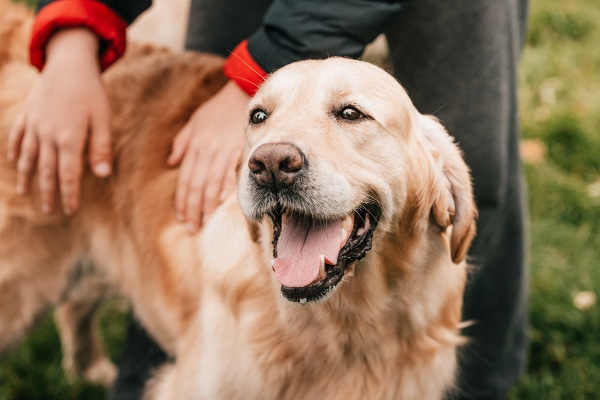If you’ve ever wondered how fast those adorable golden retrievers breathe, you’re in the right place! Golden retrievers are not only known for their friendly personalities and gorgeous golden coats, but also for their energy and remarkable athleticism. So, it’s only natural to wonder how quickly these furry pals take in oxygen. Well, get ready to uncover the answer as we dive into the fascinating world of golden retriever respiration.
When it comes to a dog’s respiration, it’s not just about the speed but also about how efficiently they breathe. Golden retrievers have a remarkable capacity for oxygen intake, allowing them to keep up with their active lifestyles. But let’s not forget that they also know how to take it easy and enjoy some leisurely belly rubs!
So, buckle up and prepare to discover the secrets of golden retriever breathing. From their energetic playtime to their cozy nap sessions, we’ll explore the pace at which these lovable pups gulp in that fresh air. By the end, you’ll have a newfound appreciation for the incredible respiratory system of golden retrievers. Let’s get started!

How Fast Do Golden Retrievers Breathe? Understanding the Breathing Rate of These Beloved Dogs
Golden Retrievers are known for their friendly and affectionate nature. They are a popular choice for families, as they are gentle, intelligent, and loyal. However, have you ever wondered how fast these beloved dogs breathe? Understanding the breathing rate of Golden Retrievers is essential in ensuring their overall health and well-being. In this article, we will dive deep into this topic, exploring the factors that influence their breathing rate, what is considered normal, and what to do if you notice any abnormal breathing patterns in your Golden Retriever.
Factors Affecting the Breathing Rate of Golden Retrievers
The breathing rate of a Golden Retriever can vary based on several factors. One of the primary factors is the level of activity or exercise they engage in. Like humans, when Golden Retrievers are active or exercising, their breathing rate will naturally increase to meet the oxygen demands of their body. Additionally, factors such as age, size, and overall health can also influence their breathing rate. Puppies tend to have a higher breathing rate than adult dogs, and smaller dogs may have a slightly faster breathing rate compared to larger breeds.
It’s important to note that the breathing rate may also be affected by environmental factors such as temperature and humidity. Hot and humid weather can make it more difficult for dogs to breathe, causing their breathing rate to increase. Similarly, stress and anxiety can also impact a Golden Retriever’s breathing rate, leading to more rapid or shallow breaths. Being aware of these factors can help you better understand and monitor your dog’s breathing patterns.
Normal Breathing Rate for Golden Retrievers
The average breathing rate for a healthy Golden Retriever at rest is typically between 10 to 30 breaths per minute. However, it’s important to remember that every dog is unique, and their breathing rate may vary slightly. Puppies tend to have a higher breathing rate, which can be around 15 to 40 breaths per minute. This is because their organs and body systems are still developing, requiring more oxygen.
When your Golden Retriever is engaged in physical activity or exercise, their breathing rate will naturally increase. However, it should return to their normal resting rate once they have finished their activity. If your dog’s breathing rate remains elevated even at rest or if you notice any signs of distress such as labored breathing, wheezing, coughing, or excessive panting, it is important to consult with a veterinarian. These symptoms could indicate an underlying health issue that requires medical attention.
The Importance of Monitoring Your Golden Retriever’s Breathing Rate
Keeping track of your Golden Retriever’s breathing rate is vital in monitoring their overall health. By knowing what is considered normal for your dog, you can quickly detect any changes or abnormalities that may require medical intervention. Regularly monitoring your dog’s breathing rate can help you spot potential respiratory problems, heart conditions, or even underlying diseases.
To monitor your dog’s breathing rate, find a quiet and calm environment where your dog is relaxed. Observe their chest movements for one minute and count the number of breaths. You can do this when your dog is at rest or after light exercise. Keep a record of the breathing rate and any observations that seem unusual or concerning. This information will be valuable when discussing your dog’s health with a veterinarian.
Signs of Abnormal Breathing in Golden Retrievers
While every dog may have variations in their breathing rate, there are certain signs that may indicate abnormal breathing patterns. These signs include:
1. Rapid or shallow breathing that persists even at rest
2. Heavy panting that lasts for an extended period of time
3. Wheezing, coughing, or choking sounds during breathing
4. Labored breathing, with visible effort in each breath
5. Blue or pale-colored gums or tongue
6. Coughing up blood or foaming at the mouth during breathing
If you notice any of these signs, it is crucial to seek veterinary attention promptly. These symptoms may be indicative of various health conditions, including respiratory disorders, heart problems, or other underlying diseases.
How to Help Maintain Healthy Breathing in Golden Retrievers
Taking proactive steps to maintain your Golden Retriever’s respiratory health can contribute to their overall well-being. Here are a few tips to help keep their breathing in optimal condition:
1. Regular exercise: Engaging your Golden Retriever in regular exercise not only helps keep them physically fit but also promotes healthy lung function.
2. Monitoring the environment: Golden Retrievers are sensitive to extreme temperatures and high humidity. Keep them in a well-ventilated area and avoid exposing them to excessively hot or humid conditions that can strain their breathing.
3. Healthy weight management: Obesity can put extra strain on a dog’s respiratory system. Help your Golden Retriever maintain a healthy weight through a balanced diet and regular exercise.
4. Regular veterinary check-ups: Schedule regular visits to the veterinarian to ensure that your dog’s respiratory health is regularly evaluated. Your vet can detect any potential issues early on and provide appropriate treatment.
Remember, the well-being of your Golden Retriever depends on understanding their breathing rate, recognizing signs of abnormal breathing, and seeking timely veterinary care when necessary. By being vigilant and proactive, you can help ensure that your furry friend enjoys a happy and healthy life.
Key Takeaways: How Fast Do Golden Retrievers Breathe?
1. Golden retrievers have an average breathing rate of 10 to 30 breaths per minute.
2. Physical activity can increase the breathing rate of golden retrievers.
3. Factors such as age and health can affect the breathing rate in golden retrievers.
4. Panting is a normal breathing behavior in dogs, including golden retrievers.
5. If you notice any changes or difficulties in your golden retriever’s breathing, it’s important to consult a veterinarian.
Frequently Asked Questions
Here are some common questions about the breathing rate of golden retrievers, with detailed answers to help you gain a better understanding.
1. How does the breathing rate of golden retrievers compare to other dog breeds?
Golden retrievers have a moderate breathing rate compared to many other dog breeds. On average, adult golden retrievers take around 10 to 30 breaths per minute. This rate can vary depending on the individual dog, their activity level, and current health. It’s important to note that puppies may have a faster breathing rate than adult dogs.
When it comes to exercise or physical activity, golden retrievers tend to pant more to help them cool down. Panting is a normal behavior observed in dogs and is their way of regulating body temperature. If you notice any significant changes in your golden retriever’s breathing rate, it is always advisable to consult a veterinarian to rule out any potential health issues.
2. What factors can affect a golden retriever’s breathing rate?
Several factors can influence a golden retriever’s breathing rate. One of the primary factors is the dog’s activity level. If a golden retriever has been running, playing, or engaging in vigorous exercise, their breathing rate will naturally increase. Similarly, hot weather or a high level of excitement can also cause the breathing rate to go up temporarily.
In addition, health conditions and underlying diseases can affect a dog’s breathing rate. Respiratory issues, heart problems, allergies, or infections may cause abnormal breathing patterns. If you notice any changes in your golden retriever’s breathing, such as heavy panting, wheezing, or extreme difficulty breathing, it is essential to have them evaluated by a veterinarian.
3. Should I be concerned if my golden retriever’s breathing rate seems faster than usual?
If your golden retriever’s breathing rate seems faster than usual and they show no signs of distress, it may not be a cause for immediate concern. Dogs can have different baseline breathing rates, influenced by factors such as size, breed, and overall health. However, if the increased breathing rate persists for an extended period or is accompanied by other symptoms such as coughing, lethargy, or loss of appetite, it is best to consult a veterinarian for further evaluation.
Keep in mind that rapid breathing can also be a sign of heatstroke or respiratory distress, which require immediate medical attention. It’s always better to err on the side of caution and seek professional advice if you are unsure about your golden retriever’s breathing rate.
4. Can anxiety and stress affect a golden retriever’s breathing rate?
Yes, anxiety and stress can potentially affect a golden retriever’s breathing rate. Just like humans, dogs can experience stress and anxiety, and their bodies may respond with physiological changes, including altered breathing patterns. Dogs may exhibit rapid, shallow breathing or panting when they feel anxious or stressed. However, it’s important to remember that excessive or chronic anxiety in dogs is not healthy and may require intervention and treatment from a veterinarian or a certified dog behaviorist.
If you notice your golden retriever displaying signs of anxiety, such as trembling, pacing, excessive panting, or other unusual behaviors, it’s crucial to address the underlying cause and provide a calm and supportive environment for your dog. Professional guidance may be beneficial in managing your dog’s anxiety to ensure their overall well-being.
5. Can a golden retriever’s breathing rate change with age?
As golden retrievers age, it is possible for their breathing rate to change. Elderly dogs may experience reduced lung capacity or conditions such as arthritis that affect their ability to take deep breaths. This can result in an altered breathing rate or pattern. Additionally, senior golden retrievers may be more prone to developing respiratory or cardiac issues, which can influence their breathing rate.
If you have an older golden retriever, it is essential to monitor their breathing rate and overall respiratory health closely. Regular veterinary check-ups can help detect any changes or underlying conditions early on, ensuring proper care and intervention if needed.

Summary
Golden retrievers have a normal breathing rate of 10 to 30 breaths per minute. Their fast breathing is often a sign of excitement or physical exertion. It’s important to note that if your golden retriever is consistently breathing rapidly at rest, it may indicate an underlying health issue that requires veterinary attention.
